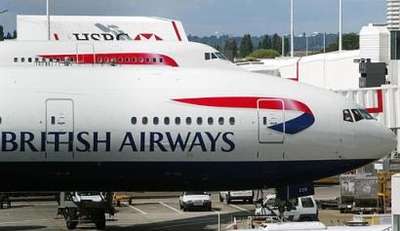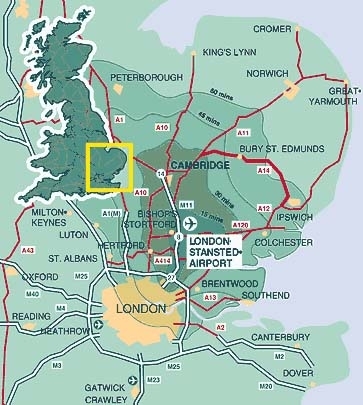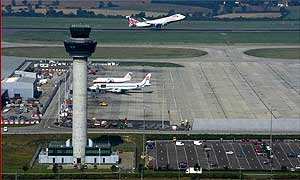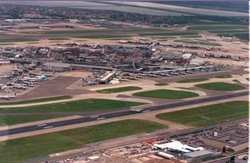Britain's Shadow Transport Minister Speaks Out On Aviation
White Paper
 Sometimes it's a better idea to shut
up and let someone else do the talking. That's what we're going to
do right here, with a speech from Britain's Shadow Secretary of
State for Transport, Damian Green MP.
Sometimes it's a better idea to shut
up and let someone else do the talking. That's what we're going to
do right here, with a speech from Britain's Shadow Secretary of
State for Transport, Damian Green MP.
In a speech to Parliament, Green Tuesday demanded that the
Transport Minister, Alistair Darling, stand firm for British
aviation and warned him about signing up to a deal between the
European Commission and the United States Government, which the
Conservatives say will be bad for large parts of the UK aviation
industry. The full text of his speech is as follows:
In the course of the next few minutes I am going to say some
things that the Minister will not like, so I should preface them by
saying that I fully recognize the difficulties facing any
Government that finds itself in the position of having to produce a
White Paper on aviation.
We all know that the opponents of any particular project are
likely to be more vociferous than its supporters. We all know the
passions that are aroused by proposals for more runways, and
looking around I suspect we will hear many of them expressed today.
At the same time we recognize that aviation has been the most
obvious success story of the transport sector over the past twenty
years, because it has been subject to competition and consumer
choice, and we want that success to continue.

So I will deal with the main issues of the White Paper and the
other issues that have arisen since. These include some
environmental considerations, some thoughts on state aids, and most
topically the subjects for the Transport Council later this week,
which could take decisions which would have far-reaching and
damaging effects on the future of British aviation.
I will first take the White Paper on its own terms. It sensibly
sets out a list of balanced criteria against which we should judge
it: the need to expand capacity and people's desire to travel by
air, alongside a wish to minimize the impact of airports on those
who live nearby, and a requirement that aviation should pay the
cost of the impact its activities on society as a whole. It's hard
to argue with any of that.
So does the Government's policy live up to its own billing? We
said at the time that the problems with the White Paper were
two-fold: first that it fudged some key issues and would therefore
cause blight around airports as legal battles were fought.
Secondly, that there was little sign of the joined-up thinking we
are always promised, either between the aviation policy and the
rest of the Department's own responsibilities, and still less
between the Transport Department and other arms of Government. I am
afraid that both those initial fears have come to pass.
Much of the debate inevitably centers on runway capacity in the
South East, and the problems both of fudge and incoherence are
illustrated by what has happened around Stansted. Some sort of
legal challenge was always likely, but what is significant is that
the challengers are seeking judicial review on the grounds that the
development of the policy in the White Paper was fundamentally
flawed. There are four aspects to this flaw: the lack of commercial
justification for a second Stansted runway, the potential for mixed
mode use of runways at Heathrow, the failure to allow comments on
proposals to extend the runway at Luton, and failure to give proper
consideration of other options around the South East.
I am sure that others will want to deal with these matters in
more detail, so I will not develop these individual complaints, but
they do illustrate the disappointment of a White Paper so long in
gestation but which seems to have missed some basic points.
I think it is legitimate to question whether the Government's
option, of an early second runway at Stansted, will ever come to
pass. Most of the growth at Stansted has been in low-cost flights
that have done so much in recent years to increase people's
opportunity to travel. But a new runway would mean higher charges,
which may drive away these low-cost operators. If BAA tries to fund
it with cross subsidy from the airlines using Heathrow, we will
certainly see another round of court cases. So the question of the
commercial viability of the second runway is a legitimate one.

The other issue starkly illustrated by Stansted is the apparent
lack of communication between Government Departments. The Transport
Secretary says he wants a second runway at Stansted within a few
years because the surrounding area is thinly populated. Meanwhile,
the Deputy Prime Minister wants to build thousands of new homes
around Stansted.
You can have a larger airport or more housing, but without
severe environmental problems you can't have both. Page 33 of the
White Paper talks about discouraging or prohibiting inappropriate
developments around airports. I hope that by now a copy has reached
the Office of the Deputy Prime Minister.
Stansted is not alone as an example of the failure to bring
Government thinking together. Birmingham Airport is the
Government's preferred location for an additional runway in the
Midlands. So it is surprising that the Department shelved plans for
an expansion of the M42 which would serve the airport directly. At
the same time we are all aware of the delays and frustrations of
the West Coast Main Line Development. It is as though the aviation
White Paper was produced in a vacuum, with no input from other
parts of the transport planning process, let alone the wider land
use planning process.
Perhaps this is best illustrated by the White Paper's attitude
to the third runway at Heathrow. This is another proposal that
inevitably arouses strong passions on both sides. But whatever
attitude one takes to the proposal it is undeniable, and the
Government is right, to say that it cannot proceed until we solve
the emissions problems that would break EU permitted limits.
Equally, it is undeniable that the main cause of the undesirable
emissions around Heathrow are cars stuck in queues on the motorways
serving the Airport. And the White Paper is silent on how the
Government proposes to solve this. It would have been extremely
useful to start a debate on the merits of ideas such as the
Airtrack scheme, or a spur to the Great Western Main Line, but this
chance was missed. The truth is that two thirds of the emissions
problems at Heathrow are caused by problems with the road and rail
infrastructure. Unless those problems are sorted, all the efforts
being made by BAA and the airlines to clean up their own act will
not have much material effect.
Indeed only in the past few says we have seen a report that
throws doubt on another part of the White Paper, the proposal for
mixed mode use of the runways at Heathrow. According to Professor
Peter Brooker, a former adviser to the Department on aircraft
noise, 42,000 people would be exposed to noise above the acceptable
threshold by the mixed mode proposal. It may still be desirable and
indeed necessary, but it would be better for all concerned if the
Government led the debate on this issue, and did not apparently try
to ignore it.
 The Minister knows that, for
environmental reasons, we need railways before we can build
runways. In a few weeks time we will see the revised version of the
10-Year Transport Plan. I can only hope that this shows more effort
at integrating surface transport with aviation than the White Paper
did.
The Minister knows that, for
environmental reasons, we need railways before we can build
runways. In a few weeks time we will see the revised version of the
10-Year Transport Plan. I can only hope that this shows more effort
at integrating surface transport with aviation than the White Paper
did.
There are of course wider environmental matters that are
current. My Hon Friend the Chairman of the Environmental Audit
Committee will no doubt have much to say on this if he catches your
eye, so I will not tread on his turf, but I will say a word about
emissions generally. All of us who wish to see a flourishing
aviation industry able to innovate and create new markets in the
way the industry has in recent years, need to take this problem
seriously.
No national Government can solve this. Indeed, striking the
right balance between a flourishing aviation industry and the need
to control emissions is something cannot even be done effectively
at a European level—welcome though the idea of a European
emissions trading scheme is. But in the end this needs countries
from beyond Europe to sign up either to minimum standards, or the
use of economic instruments to cope with these issues. We need to
be realistic and recognize that this is not going to happen in the
near future.
So any British Government will have to do what it can. We can
and should apply increasingly stringent standards on emissions and
noise, leading to the withdrawal of the noisiest and dirtiest
aircraft. If we are going to develop usable and fair economic
instruments, we need something less crude than APD. If we are going
to allow more night flying, we need much more responsive attitudes
towards local communities from airport operators and airlines,
including insulation schemes and the purchase of the worst affected
properties.
Much of this is for the longer term. But there is a vital issue
to be decided this week at the Transport Council. The Minister will
be aware that the Secretary of State will be asked to sign up to a
deal between the Commission and the United States Government which
is supposed to provide a much more liberal regime for airlines both
in Europe and in the US.
He will also be aware that the deal the Commission has
negotiated is a bad one for large parts of the UK aviation
industry. It will open up Heathrow to all US carriers, and give US
carriers unlimited access to carry passengers and cargo within and
beyond the EU. In return it does not give rights for our airlines
to fly within the US, or to buy a controlling stake in a US
airline, or even to change the rules which prohibit by law any US
official using a foreign airline.
 Other countries, with less to
negotiate with, may well feel that an imperfect deal is better than
no deal at all. It is very important that the Secretary of State
resists this. Even if he is isolated he should stand his ground.
With an election coming up in the US it is the perhaps the worst
possible time to hope for flexibility from the US side. Waiting six
months to get a better deal would be much better than rushing this
one through.
Other countries, with less to
negotiate with, may well feel that an imperfect deal is better than
no deal at all. It is very important that the Secretary of State
resists this. Even if he is isolated he should stand his ground.
With an election coming up in the US it is the perhaps the worst
possible time to hope for flexibility from the US side. Waiting six
months to get a better deal would be much better than rushing this
one through.
We want to see a more liberal regime on both sides of the
Atlantic. I am aware that some UK airlines would love to see the
slots at Heathrow freed up, and I sympathize with them. But this
has to be done alongside a better deal from the Americans. If we
miss this chance then it will damage the British aviation industry
for years to come. The Secretary of State has a heavy
responsibility and if he fails it he will be rightly castigated. I
hope he doesn't.
As I said at the outset, I recognize the conflicting pressures
on ministers. We have an aviation industry we can be proud of, but
everything it does impinges on people who have nothing to do with
the industry, and on the environment. So Ministers have to strike
the right balance. The White Paper tried to do this, but failed in
too many respects. This reflects a deeper problem: that aviation
policy is not integrated with the rest of transport policy, or the
Government's ideas on land use planning. This causes unnecessary
distress in communities around the country, as well as promoting
uncertainty among airlines and airport operators. So the White
Paper has been a missed opportunity—we will need to put that
right in the future.
 ANN's Daily Aero-Linx (04.15.24)
ANN's Daily Aero-Linx (04.15.24) Classic Aero-TV: 'No Other Options' -- The Israeli Air Force's Danny Shapira
Classic Aero-TV: 'No Other Options' -- The Israeli Air Force's Danny Shapira Aero-News: Quote of the Day (04.15.24)
Aero-News: Quote of the Day (04.15.24) Airborne 04.16.24: RV Update, Affordable Flying Expo, Diamond Lil
Airborne 04.16.24: RV Update, Affordable Flying Expo, Diamond Lil ANN's Daily Aero-Term (04.16.24): Chart Supplement US
ANN's Daily Aero-Term (04.16.24): Chart Supplement US







